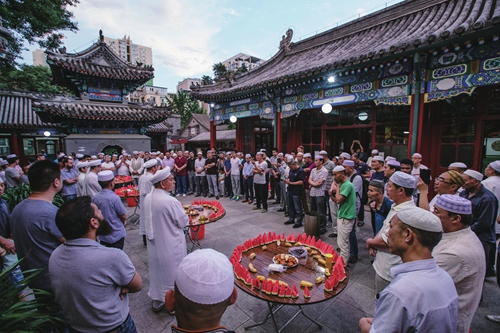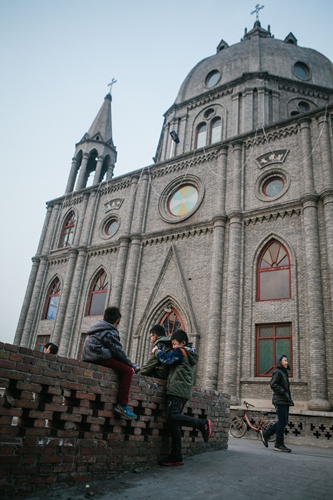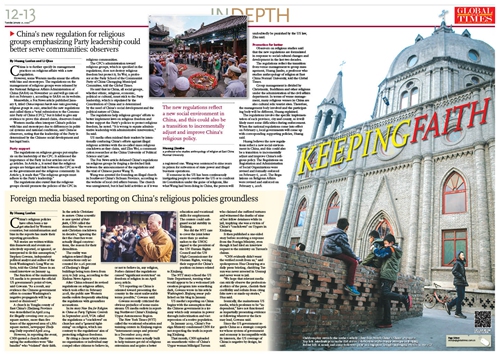HOME >> CHINA
China’s new regulation for religious groups emphasizing Party leadership could better serve communities: observers
By Huang Lanlan and Li Qiao Source:Global Times Published: 2020/1/20 21:18:41

Muslims pray in the Eid al-Fitr celebration at the Niujie Mosque in Beijing. Photo: Li Hao/GT
China is to further specify its management practices on religious affairs with a new regulation.However, some Western media smear the efforts with bias and stereotypes. The regulations on the management of religious groups were released by the National Religious Affairs Administration of China (SARA) on November 20 and will go into effect on February 1, according to SARA on its website.
Meanwhile, a Fox News article published January 8, titled China imposes harsh new rules governing religious groups in 2020, attacked the new regulations and called them a "total submission to the Communist Party of China (CPC)," but it failed to give any evidence to prove this absurd claim, observers found.
Western media often interpret China's policies with bias and stereotypes due to differences in political systems and national conditions, said Chinese observers, noting that the leadership of the Party is determined by the Chinese social development and has legal basis.
Party support
The regulations on religious groups put emphasis on the leadership of the CPC. It addressed the importance of the Party in four articles out of its 41 articles. In Article 2, it noted that the religious groups are bridges and link between the CPC as well as the government and the religious community. In Article 5, it reads that "The religious groups must adhere to the Party's leadership."
The regulations also stated that the religious groups should promote the policies of the CPC in religious communities.
The CPC's administration toward religious groups, which is specified in the regulations, does not destroy religious freedom but protect it, Su Wei, a professor at the Party School of the Communist Party of China Chongqing Municipal Committee, told the Global Times.
He said that in China, all social groups, whether ethnic, religious, economic, political or cultural, must stick to the Party leadership, which is stipulated by the Constitution of China and is determined by the need of China's social development and the political nature of China.

Children play outside the Liuhe Catholic church in North China's Shanxi Province. Photo: Li Hao/GT
The regulations help religious groups' efforts to better implement laws on religious freedom and better support the Party's policies to protect religious freedom, he noted. "It is wrong to equate administrative leadership with administrative intervention," Su said.US media often mislead their readers by intentionally confusing China's efforts against illegal religious activities with the so-called mass religious crackdown as they claim, said Zhu Wei, a communication researcher at the China University of Political Science and Law.
The Fox News article defamed China's regulations on religious groups by forging a far-fetched link between the announcement of the regulations and the trial of Chinese pastor Wang Yi.
Wang was arrested for founding an illegal church in Southwest China's Sichuan Province, according to the website of local civil affairs bureau. The church was unregistered, but it had held activities as if it was a registered one. Wang was sentenced to nine years in prison for subversion of state power and illegal business operations.
If someone in the US has been continuously instigating people to overthrow the US or to confront its Constitution under the guise of religions, like what Wang had been doing in China, the person will undoubtedly be punished by the US law, Zhu said.
Promotion for better
Observers on religious studies said that the new regulations are formulated in response to social cultural changes and development in the last two decades.
The regulations reflect the transition from venue management to group management, Huang Jianbo, a professor who studies anthropology of religion at East China Normal University, told the Global Times.
Group management is divided by Christianity, Buddhism and other religions under the administration of the civil affairs department. In terms of venue management, many religious venues in China are also cultural relic tourist sites. Therefore, the management body involved and the participating body will be different, Huang explained.
The regulations involve the specific implementation of each province, city and county, so it will likely meet some difficulties during enforcement. When the national regulations come into effect on February 1, local governments will come up with corresponding supporting policies, Huang said.
Huang believes the new regulations reflect a new social environment in China, and this could also be a transition to incrementally adjust and improve China's religious policy. The Regulations on Registration and Administration of Social Organizations were revised and formally enforced on February 6, 2016. The Regulations on Religious Affairs were revised and enforced on February 1, 2018.

Newspaper headline: Keeping faith